|
|
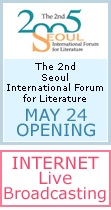 |
 |
|
|
 |


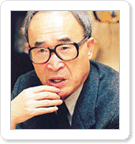 |
Ko
Un
Poet and novelist, translator
and essayist. Born 1933 in Gunsan
(North Jeolla Province). He first
began to publish his poems in the
late 1950s. His first volume of
poems, Pian-gamseong (Transcendental
sensibility) was published in 1960
while he was still a Buddhist monk.
Leading dissident spokesman during
the 1970s, he was arrested many
times, and he spent some two years
in prison after the 1980 coup d'etat.
He has published about 140 volumes
of poems, novels, essays, and translations
from Chinese. These include the
20 volumes of Maninbo (Ten thousand
lives), Naeilui norae (Songs for
tomorrow), Namgwa
buk (South and north), Neujeun norae
(Late songs), the novel Hwaom-gyeong
(Garland Sutra / Little pilgrim),
and studies of the great poets Han
Yong-un and Yi Sang. He has received
the Manhae Literary Award, the Daesan
Literary Award and the Jungang Ilbo
Literary Award. His works have been
translated into almost every major
language.
|
|
|
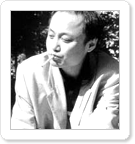 |
Goh Jong-seok
Novelist, journalist, scholar.
Born in 1959 in Seoul. Studied law
in Seonggyun-gwan University, then
pursued graduate studies in Seoul
National University and l'Ecole
des hautes etudes en sciences sociales
in Paris. He has worked as a journalist
for the Korea Times, the Hangyeore
sinmun and the Sisa Journal. He
has published a number of collections
of essays: Go Jong-seokui Europe
tongshin
(Go Jong-seok reporting from Europe),
Sarangui mal, maldeurui sarang (Words
of love, love of words), Gamyeomduin
eoneo (Polluted language), Kode
humchigi (Stealing codes) and works
of fiction: Gijadeul (Journalists)
and Jemangmae.
|
|
|
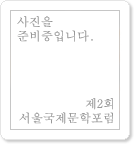 |
Ko
Hye-sun
Critic, translator and scholar.
Studied at the Hanguk University
of Foreign Studies, then the Instituto
Caro y Cuervo (Universidad Nacional
de Colombia, Bogota), and received
her PhD from her alma mater with
a study of the Peruvian novelist
Jose Maria Arguedas. She is currently
a professor in the Spanish department
of Danguk University. She has taught
as a visiting professor in the Spanish
department at Southern Oregon State
University. She has published a
number of books: Dongseoyang munhake
natanan geourui imiji (Images of
winter in
eastern and western literatures,
also in Spanish), Mestisoui naradul
(Lands of mestizos), Peruui eojewa
oneul (Peru yesterday and today).
She has translated Mexico Yesterday
and Today and a volume of poems
by the Peruvian poet Cesar Vallejo.
|
|
|
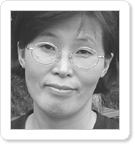 |
Gong Sun-ok
Novelist. Born in 1963 in
Gogseong (South Jeolla Province).
Studied Korean language and literature
for a time at Jeonnam University.
Began her literary career by publishing
the novella Ssiatbul (Seeds of fire)
in the review Changjakgwa bipyeong.
Has published collections of short
stories: Piora suseonhwa (Bloom,
daffodils), Motjin han sesang (One
fine world), as well as full-length
novels: Ojirie dugo on seoreunsal
(Thirty left behind in Austria),
Susupateuro oseyo (Come into the
millet field), Bulkeun podaegi (Red
quilt). Was awarded the Award for
Young Artists.
|
|
|
 |
Kwon
Young-min
Critic and scholar. Born
in 1948 in Poryeong (South Chungchong
Province). Completed undergraduate
and graduate studies in the Korean
department at Seoul National University.
Currently a professor in that department.
He has taught as a visiting professor
at UC Berkeley and at Harvard. He
has published the following books,
Hanguk hyeondae munhaksa (History
of modern Korean literature), Yun
Dong-ju yeongu (Studies on Yun Dong-ju),
Hangukui munhak bipyeong (Korean
literary criticism),
Seosayangsikgwa tamnonui geundaeseong
(Narratorial style and modernity
of discourse), as well as numerous
articles. Has received the Hyeondae
Literary Award for Criticism and
the Kim Hwan-tae Award for Criticism.
Is currently serving as managing
editor of the review Munhak Sasang.
|
|
|
 |
Kim Kyung-wuk
Novelist. Born in 1971 in
Gwangju (South Jeolla Province).
After studying in the English department
of Seoul National University he
took his M.A. in the Korean department
of the same university. Began his
literary career by publishing Outsider
which received the 1993 New Writers'
Award from the review Jakgasegye.
He has published 2 collections
of short stories: Baghdad kapeeneun
kopiga opda (No coffee in Baghdad
Cafe) and Betireul mannareo gada
(Going to meet Betty) and two novels:
Morrison Hotel and Hwanggeumsagwa
(Golden apple).
|
|
|
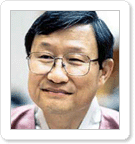 |
Kim
Kwang-kyu
Poet. Born in 1941 in Seoul.
Studied German language and literature
at Seoul National University and
the University of Munich (Germany).
Currently Professor in the German
Department of Hanyang University
(Seoul). His first poems were published
in 1975 in the review Munhakgwa
Jiseong. He has published 8 collections
of poems, including Urireul jeoksineun
majimak kkum (The last dream to
affect us), Gajin got hanado opchiman
(Nothing of my own, but still),
Cheoeum mannateon ttae (When
first we met). Has received the
Nokwon Literary Award, the Kim Su-yeong
Literary Award and the Daesan Literary
Award. His poems have been translated
into a number of languages.
|
|
|
 |
Kim Nu-ri
Scholar and translator. Born
in 1960 in Seoul. Studied German
language and literature at Seoul
National University and the University
of Bremen (Germany). Currently a
professor in the German Department
at Chungang University (Seoul).
Has published Allegoriwa yeuksa
Gunter Grass ui munhakgwa sasang
(Allegory and history: the
literary thought of Gunter Grass).
He has translated a number of books,
including Tongilgwa munhak (Unification
and literature) comparing the question
of unification in Germany and Korea.
|
|
|
 |
Kim Byung-ik
Critic. Born in 1928 in Sangju
(North Gyeongsang Province). Graduated
from the political science department
of Seoul National University. Worked
as a journalist with the Donga Ilbo
daily newspaper; served as president
of the Korean Journalists' Association;
acted as editor-in-chief of the
Munhakgwa Jiseong publishing company.
Has published a number of books:
Saeroun geulssgiwa munhakui jinjeongseong
(New writing and the authenticity
of literature), Saenggakui angwa
bak (The ins and outs of thinking),
Ichyeojineun geotgwa toisarananeun
geot (Things
forgotten, things recalled), Geul
dwie sumeun geul (The writing hidden
behind writing). Has received the
Hyeondae Literary Award, the Palbong
Award for Literary Criticism, the
Daesan Literary Award, etc.
|
|
|
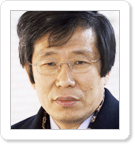 |
Kim Seong-kon
Critic, scholar. Born in 1949 in
Jeonju (North Jeolla Province).
After studying English language
and literature at Jeonnam University,
he went on to study at Columbia
University and New York City University.
He is currently a Professor in the
English Department of Seoul National
University. He has served as head
of the university's American Studies
Institute and has been president
of the Korean Association for Literature
and Media. He is currently serving
as head of the Seoul National University
Language Education Institute and
as president of the Modern British
and American Fiction Association
of Korea. Among his published books
are Munhakgwa yeonghwa (Literature
and film), Da munhwa sidaeui hangukin
(Koreans in a multi-cultural age),
Munhwa yeonguwa inmunhakui mirae
(The future of cultural studies
and the humanities), Yeonghwa sokui
munhwa (Culture in film).
|
|
|
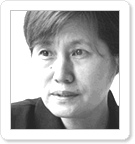 |
Seung-hee Kim
Poet, novelist, scholar. Born in
1952 in Gwangju (North Jeolla Province).
After studying English language
and literature at Sogang University,
she went on to do graduate studies
in the department of Korean language
and literature of the same university,
where she is now a professor. She
began her career as a poet in 1973.
Her first novel, Santa Fero ganeun
saram (On the way to Santa Fe),
was published in 1994. She has published
a number of volumes of poetry: Oensoneul
wihan hyeopjugok (Concerto for the
left hand), Bitjarureul tago dallineun
useum (A smile speeding down
falling rain), Namjadeureun moreunda
(Men don't know), etc. She has also
published other works of fiction,
including the novel Oenjjok nalgaega
yakkan mugeoun sae (A bird with
a lightly heavier left wing). A
selection of her poems has been
translated into English.
|
|
|
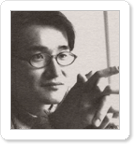 |
Kim Yeon-soo
Novelist. Born in 1970 in Gimcheon
(North Gyeongsang Province). She
began her literary career with the
publication of poems in the review
Jakgasegye but then went on to publish
a number of novels: Seumu sal (Twenty),
Goodbye isang (Goodbye ideals),
Naega ajik aiiosseul ttae (When
I was still a child), etc. She has
received the Dongin Literary Award,
the Jakgasegye Literary Award, the
Dongseo Literary Award.
|
|
|
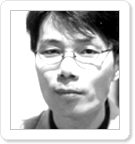 |
Kim Young-ha
Novelist. Born in 1968 in Hwacheon
(Gangwon Province). Graduated from
the business department, Yonsei
University. He began his literary
career in 1996 by publishing Geoure
daehad myeongsang (Meditation on
a mirror) in the magazine Review.
He has published a number of collections
of short stories: Naneun narul pagwihal
gweolliga itda (I have the right
to destroy myself); Hochul (Pager);
Ellibeiteoe kkin geu namjaneun eotteoke
toeeotna (What happened to that
man stuck in the elevator?)
and two volumes of essays Gulbi
nakksi (Fishing for corbina fish)
and Post-it. His first volume was
translated into French, a number
of his stories have been translated
into English. He has received the
Dongin Literary Award, the Isan
Literary Award, and the Hyeondae
Literary Award.
|
|
|
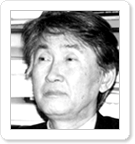 |
Kim Uchang
Critic and scholar. Born in 1937
in Hampyeong (South Jeolla Province).
Studied in the English department
of Seoul National University and
then at Cornell and Harvard Universities
in the United States. Is now Professor
Emeritus in the English department
of Korea University (Seoul). He
began his career as a literary critic
with the publication in 1965 of
the essay Jonjaeui insikgwa gamsuseongui
jonjung (Awareness of being and
respect for sensibility) in the
magazine Sindonga. Since then he
has published a number of volumes
on literary topics: Gungpiphan sidaeui
siin (Poet for a destitute age);
Simmijeok iseongui tamgu
(Discourse of aesthetical reasoning);
Jeongchiwa salmui segye (World of
politics and life); Haengdonggwa
sayu (Actions and causes). Has served
as president of the Korean Association
for Critical Theory. Has received
the Seoul Award for Cultural and
Artistic Criticism, the Palbong
Award for Literary Criticism, the
Daesan Literary Award etc.
|
|
|
 |
Kim In-hwan
Critic. Born in Seoul in 1946. Completed
undergraduate and graduate studies
at Korea University. Began his career
as a literary critic in 1971 by
publishing Bak Du-jin siron (Poetic
theory of Bak Du-jin) in the magazine
Hyeondaemunhak. Has published a
number of volumes of literary criticism:
Sangsangryeokgwa wongeunbeop (Imagination
and perspective); Eoneohakgwa munhak
(Linguistics and literature),
Bipyeongui wolli (Principles of
criticism), Gieokui gyedan (Stairs
of memory), Dareun miraereul wihayeo
(For another future). Has received
the Seoul Award for Cultural and
Artistic Criticism.
|
|
|
 |
Kim Jong-kil
Poet, translator, critic, scholar.
Born in 1926 in Andong (North Gyeongsang
Province). After completing undergraduate
and graduate studies in the English
department of Korea University he
received a Ph.D. from Sheffield
University (U.K.). Is currently
Emeritus Professor in the English
department of Korea University.
He began his career as a poet in
1947 when his work received the
New Year Award from the Gyeonghyang
sinmun. He has published several
volumes of poetry, of essays on
poetry, and of poetry translations
from English and has also translated
works by a number of Korean poets
into English. His volumes of poetry
include Seongtanje (Christmas),
Hahoeeseo (At Hahoe), Haega manhi
jjalbajieotta (The years are getting
much shorter); his volumes of criticism
include Siron (Theory of poetry),
Jinsilgwa eoneo (Truth and language).
He has published a volume of essays
written in English, The Darling
Buds of May.
|
|
|
 |
Kim Hwa-young
Critic, translator. Born in 1942
in Yeongju (North Gyeongsang Province).
Completed undergraduate and graduate
studies in French at Seoul National
University before earning his doctorate
at the University of Provence (France).
He is currently professor in the
French department of Korea University
(Seoul). He has published a number
of volumes of literary criticism:
Munhak sangsangrokui yeongu: Albert
Camus-ron (Studies in the literary
imagination: theories on Albert
Camus), Soseolui
kkotgwa ppuri (Flowers and roots
of fiction), Hangukmunhakui sasaenghwal
(Private life of Korean literature).
He has also published a number of
volumes translated from French,
including Camus' L'etranger.
|
|
|
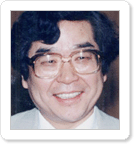 |
Do Jung-il
Critic. Born in 1941 in Seoul. Studied
English literature at Gyeonghui
University (Seoul) and at the University
of Hawaii (United States). Publishes
articles on literature, culture
and social issues. He is a leading
participant in the "Movement
to produce a book-reading society."
He has published Siineun supeuro
gaji mothanda (A poet cannot enter
a forest).
|
|
|
 |
Moon Hi-Kyung
Critic, scholar. Born in 1955 in
Seoul. Completed undergraduate and
graduate studies in English literature
at the University of Oxford (U.K.).
Is currently a professor in the
English department of Korea University
(Seoul). She has published a number
of articles and books on seventeenth-
and eighteenth-century English literature,
as well as translations.
|
|
|
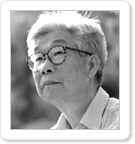 |
Park Yi-moon
Poet, critic. Born in 1930 in Asan
(South Chungchong Province). Studied
French at Seoul National University
and Paris-Sorbonne (France) then
philosophy at the University of
Southern California. He began to
publish poetry in 1955 and critical
articles in 1957. He has published
a number of volumes of poetry including
Nune teophin chalseu gangbyeon (Charles
River under snow), Nabiui kkum (Butterfly's
dream). His collections
of essays include Munhakgwa eoneoui
kkum (Dreams of literature and language),
Ajik kkeutnaji anhneun gil (The
road not yet finished), Haengbokhan
heomujuuijaui yeolcheong (Ardor
of a happy nihilist).
|
|
|
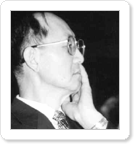 |
Paik Nak-chung
Critic, scholar. Born in 1938 in
Daegu. Studied English literature
at Brown University and Harvard.
Is currently Emeritus Professor
in the English department of Seoul
National University. Editor-in-chief
of Changjakgwa bipyeong since 1966.
Has published a number of books
of literary criticism: Hyeondae
munhakeul poneun sigan (On seeing
modern literature), Minjokmunhakgwa
segyemunhak (Korean literature and
world literature),
Heundeullineun Bundancheje (Shaky
structures of division). Has received
the Simsan Award, the Daesan Literary
Award, the Yosan Literary Award,
the Manhae Prize etc.
|
|
|
 |
Bok Geo-il
Novelist, poet. Born in 1946 in
Asan (South Chungchong Province).
Studied economics at Seoul National
University. Began his career as
novelist and poet with publications
in 1987. His publications include
volumes of fiction: Paran dal arae
(Beneath a red moon), Kaemp Senekaui
gijichon (Village outside Camp Seneca)
etc. volumes of poetry: Nai deureoganeun
anaereul wihan jajangga (Lullaby
for my wife as she grows older)
etc. and other titles: Gukjeeo sidaeui
miinjokeo (Korean in an age of international
language), Jugeun jadeureul wihan
byeonho:21 segi chinilmunje (Defence
of the dead: the pro-Japanese problem
in the 21st century). Much of his
writing concerns political and social
issues.
|
|
|
 |
Suh Ji-moon
Translator. Born in Seoul in 1948.
Studied English literature at Ewha
Womens University (Seoul) then at
West Georgia College and the State
University of New York (U.S.). She
is a professor in the English department
of Korea University and has taught
Korean studies at S.O.A.S in London
University (U.K.) in addition to
time spent at the universities of
Stanford and Harvard. Her publications
include: Insaengui gisul (Human
crafts) and Eoriseokeumul
tamhamyeo (Longing for folly) in
addition to a number of volumes
of translation into English of Korean
literature.
|
|
|
 |
Sung Min-yop
Critic. Born in 1956 in Geochang
(South Gyeongsang Province). Completed
undergraduate and graduate studies
in the Chinese department of Seoul
National University, where he is
currently a professor. He began
his career as a critic in 1982.
He has published a number of volumes
of criticism as well as translations:
Jiseonggwa silcheon (Intelligence
and practice), Munhakui bingon (Poverty
of literature), Byeonhaneun gotgwa
byeonhaji anneun
got (Changing things and unchanging
things). He is currently an editor
of the review Munhakgwa jiseong.
|
|
|
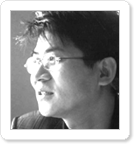 |
Sung Suk-Je
Poet, novelist. Born in 1960 in
Sangju (North Gyeongsang Province).
Studied law at Yonsei University
(Seoul). Published his first poems
in the review Munhaksasang in 1986,
and his first work of fiction in
1995. Has published several collections
of shorter fiction: Saega toeeotne
(I've become a bird), Hollim (Possession),
Beonjjeokhaneun hwanghorhan sungan
(Sparkling moment of ecstasy) as
well as the novels Gungjeonui sae
(Palace bird),
Sunjeong (Purity). Has received
the Hanguk Ilbo Literary Award,
the Dongseo Literary Award, the
Dongin Literary Award, etc.
|
|
|
 |
Shim Yoon-Kyung
Novelist. Born in 1973. Completed
undergraduate and graduate studies
in the department of molecular biology
at Seoul National University. She
published her first work of fiction
in 1998. Her Naui areumdaun jeongwon
(My beautiful garden) received the
2002 Han Gyeore Literary Award.
Has recently published the novel
Darui jedan (Altar of the moon).
|
|
|
 |
Oh Saeng-keun
Critic. Born in 1946 in Seoul.
Completed undergraduate and graduate
studies in the French department,
Seoul National University before
completing a doctorate in the University
of Paris. His first critical essays
were awarded the New Year Literary
Award by the Donga Ilbo in 1970.
He has published a number of volumes
of critical writing: Hwang Sun-won
yeongu (Studies in Hwang Sun-won),
Geuriumeuro jitneun munhakui jip
(House of literature
built of longing), Munhakui supeseo
neurige geotgi (Slow walks in the
forest of literature). He received
the Daesan Literary Award.
|
|
|
 |
Oh Se-young
Poet, critic. Born in 1942 in Yeonggwang
(South Jeolla Province). He completed
undergraduate and graduate studies
in the Korean department of Seoul
National University, where he is
at present a professor. He began
his literary career in 1966, with
poems published in the review Hyeondae
Munhak. His published volumes of
poetry include Mumyeongyeonsi (Anonymous
poems), Haneurui si (Heaven's poems),
Bomeun Jeonjaengcheoreum (Spring
like war). He has also published
critical studies:
Sijeok sangsangryeokgwa eoneo (Language
and the poetic imagination), Hanguk
hyeondae siin yeongu (Studies of
modern Korean poets). He has received
the Soweol Literary Award, the Jeong
Ji-yong Literary Award, the Pyeonun
Literary Award, the Manhae Literary
Award etc.
|
|
|
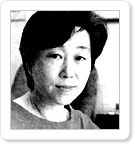 |
Oh Jung-hee
Novelist. Born in 1947 in Seoul.
Graduated from the creative arts
department of Seorabeol Arts College
(now Jungang University). Her writing
career began in 1968 when her first
work Wangujeomyeoin (The toyshop
woman) received the New Year Award
from the Jungang Ilbo. Her published
work includes; Yunyon ui tteul (The
Garden of Childhood), Baramui nok
(Spirit of the Wind), Sae (Bird),
etc. She has received the Yi Sang
Literary Award, the
Dongin Literary Award etc.
|
|
|
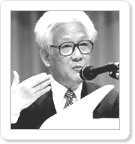 |
Yu Jong-ho
Critic. Born in 1935 in Chungju
(North Chungchong Province). Studied
in the English department of Seoul
National University then at the
State University of New York (U.S.)
and Sogang University (Seoul). He
is currently Distinguished Professor
in the Korean department of Yonsei
University. His first publication
as a critic dates from 1957. He
has published a number of volumes
of literary criticism: Bisunsuui
seoneon (Disordered declaration),
Munhakui jeulgeoum (Pleasure of
literature), Munhakiran muosinga
(What is literature?),
Dasi ikneun hanguk siin (Rereading
Korean poets), Naui haebang jeonhu
(Before and after my liberation)
etc. Has received the Seoul Award
for Cultural and Artistic Criticism,
the Republic of Korea Literary Award,
the Pyeongun Literary Award, the
Daesan Literary Award etc.
|
|
|
 |
Yoon Sang-in
Critic, scholar. Born in 1955. Studied
in the Korean department of Sogang
University (Seoul) then studied
comparative literature in the graduate
school of Tokyo University (Japan).
Is currently professor in the department
of Japanese language and culture
in the International Cultures College
of Hanyang University. He has spent
time as a visiting scholar in the
University of London (U.K.) and
as a special lecturer in Tokai University
(Japan). He has
received the Santory Award for one
of his books published in Japanese.
|
|
|
 |
Lee Nam-ho
Critic. Born in 1956 in Busan. Completed
undergraduate and graduate studies
at Korea University (Seoul) and
he is currently a professor in the
department of Korean education at
the same university. He began his
career as a critic in 1980 and has
published a number of volumes: Munhakui
wijok (Literature's pedestal), Hanguk
daehasoseol yeongu (Studies in Korean
large-scale fiction), Noksaekeul
wihan munhak (Literature for green),
as well as more general works: Sangsangryeokui
Bomulchanggo (Treasure chest of
the imagination), Honjamanui sigan
(Time all alone), etc. Has received
the Hyeondae Literary Award, the
Socheon Award for Criticism, etc.
|
|
|
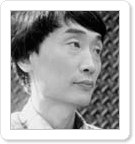 |
Lee In-sung
Novelist. Born in 1953 in Jinhae
(South Gyeongsang Province). Studied
in the French department of Seoul
National University. Published his
first work of fiction in 1980 in
the magazine Munhakgwa jiseon. He
has published Michyeobeorigo sipeun
michyeoborichi anhneun (Not mad
wishing to be mad), Haneopsi najeun
sumgyeol (Infinitely low breathing),
Gang eogwie seom hana (Island at
the mouth of the river), etc. Has
received the Hanguk Ilbo Literary
Award.
|
|
|
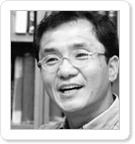 |
Lim Ji-hyun
Scholar. Born in 1959 in Yeongju
(North Gyeongsang Province). Completed
undergraduate and graduate studies
in the department of history at
Sogang University (Seoul) before
teaching and doing research at the
universities of Warsaw and Krakow
in Poland. He is currently professor
in the history department at Hanyang
University. Has served on the editorial
boards of the reviews Yeoksawa munhwa
(History and culture) and Dangdaebipyeong
(Current-day criticism). He is at
present director of his university's
Center for Comparative
Studies in Historical Culture. Has
published a number of volumes, such
as Mareukseu engelseuwa minjokmunje
(Marx, Engels and Korean problems),
Minjokjuuineun banyeokida (Nationalism
is treason), Inyeomui soksal (Ideology's
inner parts), Jeokdaejeok gongbeomjadeul
(Hostile accomplices) etc.
|
|
|
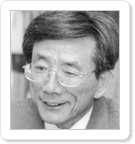 |
Jang Hoe-ik
Environmental activist. Born in
1938 in Yecheon (North Gyeongsang
Province). Studies physics at Seoul
National University, then at the
state universities of California
and Louisiana in the U.S. He is
now Emeritus Professor in the physics
department of Seoul National University.
Hi publications have mainly been
designed to promote a better understanding
of the nature of science among a
wider public: Gwahakgwa metagwahak
(Science and meta-science), Salmgwa
onsaengmyeong (Living
and total life).
|
|
|
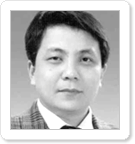 |
Jung Gwa-ri
Critic, scholar. Born in 1958 in
Daejeon. Completed undergraduate
and graduate studies in the French
department of Seoul National University.
Is currently professor in the Korean
department of Yonsei University
(Seoul) Began to publish critical
essays in 1979. Has published a
number of volumes of criticism:
Jonjaeui byeonjeungbeop (Dialectic
of being), Munmyeongui baekkop (Civilization's
navel), Mudeom sokui Majellan (Magellan
in the tomb). Has received the Socheon
Award for Criticism, the Palbong
Award for Literary Criticism, etc.
|
|
|
 |
Jung Doo-hi
Scholar. Completed undergraduate
and graduate studies in the history
department of Sogang University
(Seoul) and is currently professor
in the history department of that
university, having also served as
professor at Jeonbuk University
(Daejeon) and as a Yenching Visiting
Professor at Harvard University
(U.S.). Among his published books
are: Migukeseoui hanguksayeongu
(Studies in Korean history in the
United States), Jo Gwang-jo, and
Nae ane sara sumswineun yeoksa (History
alive and breathing
inside me), etc.
|
|
|
 |
Jung Jae-seo
Writer. Born in 1952 in South Chungchong
Province. After studying botany
in Seoul National University as
an undergraduate she did graduate
studies in the Chinese department.
Among her books are Dongyangjeogin
geosui seulpeum (The sorrow of things
eastern), Dogyowa munhak geurigo
sangsangryeok (Daoism, literature
and imagination), Iyagi dongyangsinhwa
(Oriental myths retold). Has translated
the Chinese Classic of Mountains
and Seas (Shan hai ching) into Korean.
Received the Writers
Award in the Korean Publishers'
Cultural Awards.
|
|
|
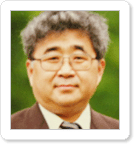 |
Chung Chung-ho
Scholar. Born in 1947 in Seoul.
Completed undergraduate and graduate
studies in English at Seoul National
University, then received his doctorate
from the University of Wisconsin
(U.S.). He is currently a professor
in the English department of Jungang
University (Seoul). He has also
spent time as a visiting professor
at Leeds University (U.K.) and Griffiths
University (Australia). He is currently
head of the university's Australian
Study Center, president of the Korean
Association for Literature and the
Environment, and vice-president
of the Association for Critical
Theory, as well as editing
the occasional review Korean Literature
Today. He has published Segyehwa
sidaeui bipanjeok pedagoji (Critical
pedagogy of the age of globalization),
Munhakgwa hwangyeong (Literature
and the environment), Talgeundaewa
yeongmunhak (The postmodern and
English literature) etc.
|
|
|
 |
Jo Eun
Sociologist, novelist. Born in 1946
in South Jeolla Province. After
studying English at Seoul National
University went on to do graduate
studies in social sciences at the
University of Hawaii (U.S.). She
is now a professor in the social
sciences department of Dongguk University
(Seoul). Among her published books:
Jeolbanui gyeongheom jeolbanui moksori
(Half an experience half a voice),
091012 "gongbu yeolsimhi"ragu?
(091012 "study hard?) etc.
Has also published a collection
of works of fiction,
Chimmukeuro jieun jip (House built
of silence).
|
|
|
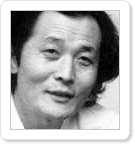 |
Jo Chong-rae
Novelist. Born in 1943 in Seonam-sa
temple (South Jeolla Province).
Graduated from the Korean department
of Dongguk University. Is currently
Chair Professor at Dongguk University.
Began his career as a writer in
1970 by publishing the novel Numyeong
(False charge). Has published collections
of short stories: Eotteon jeonseol
(Some legend), Hwangto (Yellow earth),
Han, geu geuneurui jari (Han, where
that shadow lies), the novels Daejanggyeong
(Tripitaka), Bulnori (Fireworks),
and the extended multi-volume
novels Taebaeksanmaek (Taebaek Mountain)
and Arirang. Has received the Hyeondae
Literary Award, the Republic of
Korea Literary Award, the Dongguk
Literary Award, the Nosin Literary
Award etc.
|
|
|
 |
Choi Dong-ho
Critic, poet. Born in 1948 in Suwon
(Gyeonggi Province). Completed undergraduate
and graduate studies in the Korean
department of Korea University (Seoul)
and is currently a professor in
that same department. He began to
publish critical essays in 1979
when he won the prize in the Jungang
Ilbo's New Year's literary competition.
He has published volumes of criticism:
Si ilkkiui jeulgeoum (Pleasure of
reading poetry), Dijiteol munhwawa
saengtaesihak (Digital culture and
ecological poetry), Hangukhyeondaesiui
gamgak (Emotion in modern Korean
poetry). Has also
published volumes of poetry: Ttakttagurineun
eodie sumeoitneunga (Where is the
woodpecker hiding?), Hwangsaparam
(Yellow dust storm), Gongnorihaneun
Darma (Darma playing ball). Has
received the Republic of Korea Literary
Award, the Socheon Award for Literary
Criticism, the Pyeonun Literary
Award, etc.
|
|
|
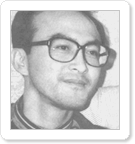 |
Choi Seung-ho
Poet. Born in 1954 in Chungcheon
(Gangwon Province). Graduated from
Chuncheon Teachers' College. First
poems published in 1977 in the review
Hyeondaesihak. Has published a number
of volumes of poetry, including
Nunsaram (Snowman), Grotesque, Moraeingan
(Sandman), Amugeotdo animyeonseo
modeun geosin na (I: nothing and
everything), etc. Received the Today's
Writers Award, the Gim Su-yeong
Literary Award,
the Daesan Literary Award, etc.
|
|
|
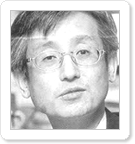 |
Choi Won-shik
Critic. Born in 1949 in Incheon.
Completed undergraduate and graduate
studies in the Korean department
of Seoul National University. Is
currently a professor in the Korean
department of Inha University (Incheon).
Began his career as a critic in
1972. Has published the following
volumes: Minjokmunhakui nolli (Logic
of Korean literature), Saengsanjeok
daehwareul wihayeo (For a productive
dialogue), Hanguk geundaemunhakeul
chajaseo (In search of modern Korean
literature), Munhakui gwihwan (Repatriating
literature). Contributes regularly
to the journal Changjakgwa bipyeong.
Received the Daesan Literary Award.
|
|
|
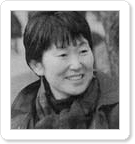 |
Choi Yun
Novelist, translator. Born in 1953
in Seoul. Completed undergraduate
and graduate studies in the Korean
department of Sogang University,
then did a doctorate in French literature
at the University of Provence (France).
She is currently a professor in
the French department of Sogang
University. Her first publication,
in 1988, was the novella Jeogi sorieopsi
hanjeom kkotipi jigo (There one
flower blooms soundlessly), and
she has published several novels,
including Hoesaeknunsaram (Person
with gray eyes), Sup sokui binteo
(Clearing in the forest), Yeolsegaji
ireumui kkothyanggi (Flower fragrance
with thirteen different names),
Maneking (Mannequin) etc.
She is also responsible for the
series of Korean literature in translation
published by Actes Sud in France,
translating works by Yi Mun-yeol,
Yi Cheong-jun etc. Her novels have
received the Dongin Literary Award,
the Yi Sang Literary Award, etc,
her translations have received the
Republic of Korea Translation Award,
the Daesan Translation Award etc.
|
|
|
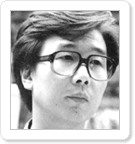 |
Choi In-seok
Novelist, dramatist. Born in 1953
in Namwon, North Jeolla Province.
First established as a dramatist
with the play Byeokgwa jang (Wall
and window), followed by other plays
such as Eotteon saramdo sarajiji
anhneunda (No one disappears), for
which he received the Republic of
Korea Literary Award, the Baek Sang
Arts Award etc. before moving on
to write the scenario for the film
Chilsuwa Mansu (Chilsu and Mansu).
With the publication in 1986 of
the novel Gugyeongkkun (Onlooker),
he began to focus on novel-writing,producing
such works as Nareul saranghaneun
pein (Pain that loves me), Gureongideurui
jip (Snakes' house), Isanghan naraeseo
on spai (Spy from a strange land)
etc.
|
|
|
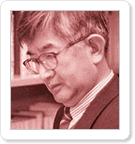 |
Choi Jang-jip
Political scientist. Born in
1943 in Gangneung (Gangwon Province).
Completed undergraduate and graduate
studies in the political science
department at Korea University (Seoul)
before graduated from the University
of Chicago (U.S.) and becoming a
professor in the political science
department of his alma mater. He
is currently the head of the university's
Study Center for Asian Problems.
He has published Hanguk minjujuuiui
iron (Theory of Korean democracy),
Hangukui nodongundonggwa gukga (The
Korean workers' movement and the
state), Minjuhwa ihuui minjujuui
(Democracy after democratization)
etc.
|
|
|
 |
Choi Jae-chul
Japanese studies scholar. Born in
1952. Completed undergraduate and
graduate studies at the Hanguk University
of Foreign Studies before studying
at the graduate school of Tokyo
University (Japan). Has published
Ilbonmunhakui ihae (Understanding
Japanese literature) and has also
published works translated from
Japanese.
|
|
|
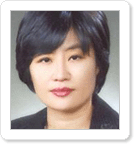 |
Choi Hye-sil
Critic. Born in 1962 in Seoul. Completed
undergraduate and graduate studies
in Korean at Seoul National University.
Is currently professor in the Humanities
and Social Sciences College of KAIST.
She has spent time at Harvard as
visiting professor. She received
the 1991 New Writers Award from
the magazine Munhaksasang, as well
as the 1992 Gim Hwan-tae Award for
Literary Criticism. Her publications
include Hanguk modeonijeum soseol
yeongu (Studies in modernist Korean
fiction), Sinyeoseongdeureun
mueoseul kkumkkuosneunga (What were
the new women dreaming of?), Dijiteol
sidaeui munhwa ilkgi (Reading the
culture of the digital age), Dijiteol
sidaeui yeongsangmunhwa (The culture
of the visual media in the digital
age), etc.
|
|
|
 |
Hyun Ki-Young
Novelist. Born in 1941 in Jeju Island.
Studied in the English department
of Seoul National University. Began
his literary career when his short
story Abeoji (Father) won the New
Year's Literary Award of the Donga
Ilbo. Has published a number of
novels, including Suni Samchon (Suni's
cousin), Jisange sutgarak hana (One
spoon on the earth), Badawa suljan
(Sea and wineglass) etc. Has received
the Hanguk Ilbo Literary Award,
the Manhae Literary
Award, the O Yeong-su Literary Award
etc. Is currently serving as the
head of the Korean Culture and Arts
Foundation.
|
|
|
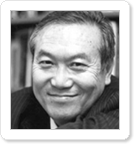 |
Hwang Tong-gyu
Poet. Born in 1938 in Seoul. Completed
undergraduate and graduate studies
in the English department of Seoul
National University, where he is
currently a professor. He began
his career as a poet with the publication
of his first poems in the review
Hyeondaemunhak in 1958. Has published
a number of collections of poetry
including Ageoreul josimharago?
(You said to beware of the crocodile?),
Pungjang (Wind burial), Beokeullipungui
sarang norae (Love song of Berkeley
wind), Uyeone gidael ttaedo issotda
(There were times
when you could lean on chance too).
Has received the Hyeondae Literary
Award, the Republic of Korea Literary
Award, the Isan Literary Award,
the Daesan Literary Award, the Midang
Literary Award etc.
|
|
|
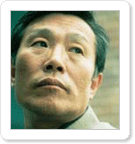 |
Hwang Seok-young
Novelist. Born in 1943 in Shenyang
(Manchuria). Studied in the philosophy
department of Dongguk University.
His first work was published in
1962 but he only became fully recognized
when his Tap (Pagoda) received the
prize in the New Year's Awards of
the Joseon Ilbo. Has published a
number of novels: Gaekji (Strange
land), Jang Gil-san, Oraedoen jeongwon
(Ancient garden), Sonnim (Guest),
Sim Cheong, etc. Has received the
Manhae Literary Award, the Danjae
Award, the Daesan Literary Award,
etc.
|
|
|
 |
Hwang Jong-yeon
Critic. Born in 1960. Completed
undergraduate and graduate studied
in the Korean department of Dongguk
University, before studying at Columbia
University (U.S.). Is currently
a professor in the Korean department
of Dongguk University. Has published
critical studies: Gim Su-yeong gipi
ilkgi (Reading Kim Su-young deeply),
Biruhan geosui kanibal (Carnival
of abject things),
etc. Has received the Socheon Award
for Literary Criticism, the Go Seok-bi
Award for Literary Criticism, etc.
Is currently on the editorial board
of the review Munhakdongne.
|
|
|
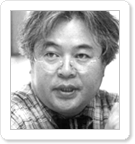 |
Hwang Ji-Woo
Poet. Born in 1952 in Haenam (South
Jeolla Province). After undergraduate
studies in the department of aesthetics
at Seoul National University did graduate
studies in philosophy at Sogang University
(Seoul). His poetic career began in
1980 and he has published a number
of collections of poetry: Saedeuldo
sesangeul tteuneunguna (Even the birds
are leaving the world), Ge nun sokui
yeonkkot (Lotus in a crab's eye),
Jeomulmyeonseo bitnaneun bada (Sea
gleaming as night falls) etc.
He has also published a drama, Oweorui
sinbu (May bride). Has received the
Kim Su-yeong Literary Award, the Hyeondae
Literary Award, the Soweol Poetry
Award, the Daesan Literary Award etc.
|
|
| |
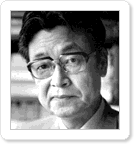 |
Kim Yun-shik
비평가, 명지대 국문과 석좌 교수. 1936년 경남 진영에서
출생하였고 서울대 사범대 국문과, 서울대 대학원 국문과를 졸업하였다.
1962년 <현대문학>에 「문학사방법론 서설」이 이
추천되어 문단에 나왔으며, 서울대 국문과 교수직을 역임했다.
주요 저서로 『한국소설사』, 『한국 현대문학 비평사론』, 『한국문학사』,『황홀경의
사상』, 『우리 소설을 위한 변명』등이 있으며, 현대문학
신인상, 한국문학 작가상, 김환태평론문학상, 대한민국문학상,
팔봉비평문학상, 요산문학상등을 수상하였다.
|
|
| |
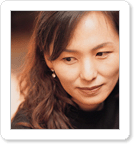 |
Gong Ji-young
소설가. 1963년 서울에서 출생하여 연세대 영문과를 졸업하였다.
1988년 <창작과 비평>에 「동트는 새벽」으로 등단하였으며,
소설 『우리는 누구이며 어디서 와서 어디로 가는가』,『인간에
대한 예의』,『무소의 뿔처럼 혼자서 가라』, 『고등어』,『봉순이
언니』등이 있다. 한국소설문학상, 오영수문학상, 21세기문학상등을
수상했다.
|
|
| |
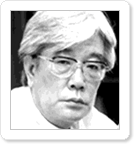 |
Kim Won-il
소설가. 1942년 경남 김해에서 출생하였고 서라벌예대 문예창작과와
영남대 국문과, 단국대 대학원 국문과를 졸업하였다. 1966년
대구매일신문 신춘문예에 소설 「1961·알제리아」가 당선되고,
1967년 <현대문학>에 장편 「어둠의 축제」가 당선되어
등단하였다. 도서출판 국민서관의 이사직과 중앙대 문예창작과
강사직을 역임했다. 대표작으로 『어둠의 혼』, 『마음의 감옥』,
『도요새에 관한 명상』, 『손풍금』등이 있다. 현대문학상, 한국소설문학상,
동인문학상, 이상문학상, 황순원문학상 등을 수상하였다.
|
|
| |
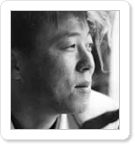 |
Lim Chul-woo
소설가, 한신대 문예창작과 교수. 1954년 전남 완도군 평일도에서
태어나, 전남대 영문과와 서강대 대학원 영문과를 졸업했다. 1981년
서울신문 신춘문예에 단편 「개도둑」이 당선되어 등단하였다.대표작으로
『붉은 방』,『봄날』,『아버지의 땅』,『그 섬에 가고싶다』등이
있으며 한국창작문학상, 이상문학상, 단재문학상등을 수상하였다.
|
|
| |
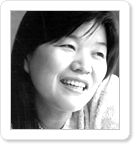 |
Shin Kyung-suk
소설가. 1963년 전북 정읍에서 출생하여, 서울예술전문대학
문예창작과를 졸업하였다. 1985년 <문예중앙>에
중편소설 「겨울 우화」를 발표하면서 등단하였다.주요작으로는 『풍금이
있던 자리』,『깊은 슬픔』,『외딴 방』,『기차는 7시에 떠나네』,『바이올렛』등이
있으며 한국일보문학상, 현대문학상, 만해문학상, 동인문학상,
이상문학상 등을 수상했다.
|
|
| |
 |
Jeon Young-ae
시인, 서울대 독문과 교수. 1951년 경북에서 태어나, 서울대
독문과 및 동대학원을 졸업하였다. 저서로 『카프카 나의 카프카
』,『독일의 현대문학』,『바이마르에서 온 편지』등이 있고 번역서
『사랑에 대하여』, 『데미안』등이 있다.
|
|
|
|
 |
|
 |
|

